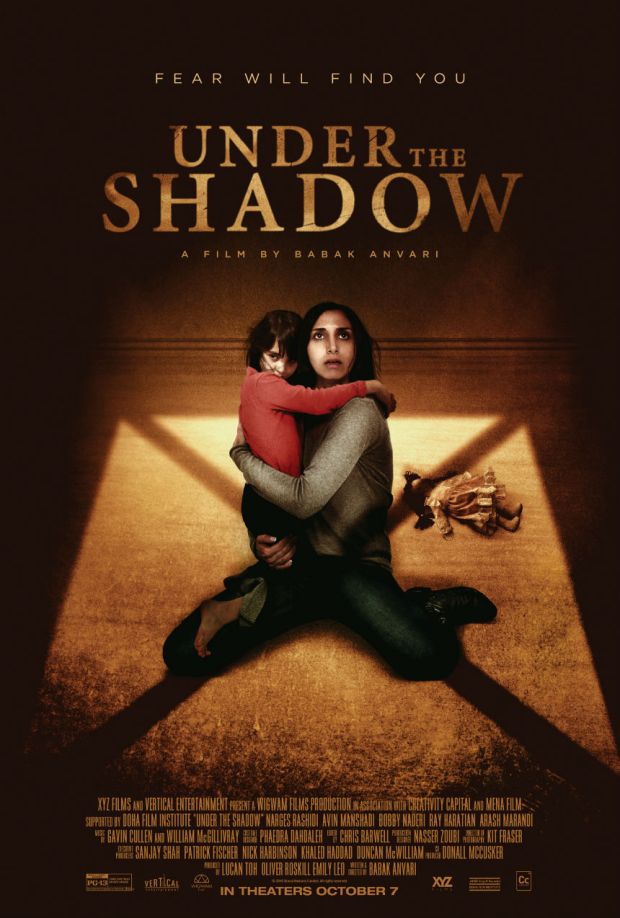Under the Shadow is one of the rare films that piques interest in both hardcore cinephiles and horror enthusiasts. The former are intrigued by how it’s been submitted to the Oscars in the foreign film category for the UK, while the latter are intrigued by its comparisons to The Babadook. Both groups should find something interesting in Under the Shadow, film that weaves politics, history, motherhood and the supernatural into a unique, spine-chilling film.
Set in Tehran in the 1980s, during Iran/Iraq war, the film follows young mother Shideh. She had been attending university to become a doctor before the Iranian revolution and wants to continue her studies. The university rejects her based on her foray into left-wing politics at the time, and she dejectedly returns to her current life as a stay at home mom. Her husband, Iraj, successfully completed medical school and practices as a doctor, and can’t see why Shideh is so torn up about not being able to do the same. He is soon called to the front lines of the war where he must serve as a medic, leaving Shideh alone in their apartment with Dorsa, the couple’s young daughter. Iraj wants the two of them to leave the city and stay with his mother, but Shideh is stubborn and resentful. She insists the two will remain in their home, regardless of the bombs dropping almost daily.
There are air raid sirens regularly, and the apartment building’s residents must run and hide together in the basement, a makeshift bomb shelter. There is a new kid in the building who whispers scary stories to Dorsa, but his aunt and uncle swear he’s been mute since his parents were killed. Dorsa is convinced the Djinn, a Persian mythological creature, is out to get her. After a missile crashes into their building (but doesn’t go off), and Shideh is unable to save the life of an elderly neighbour, everything begins to escalate. Similar to the Babadook, it’s the psyche of the mother that’s in the centre of the story here. Shideh is angry she won’t be able to become a doctor, frustrated at her circumstances, somewhat resentful of her husband and maybe even her daughter. Her fears and insecurities are being preyed on by the Djinn, who sometimes call her disguised as her husband’s voice saying she’s a bad mother, and straight out tell Dorsa that her mother can’t take care of her, and she’s better off with them.
Shideh’s frustration mounts throughout the film, but her stubbornness is what keeps her from acting most of the time. Each time the siren blares and the family runs to the basement, less and less of her neighbours appear. Everyone is clearing out of the building and leaving the city, but Shideh feels she must remain. Dorsa has fallen ill, saying it’s because the Djinn stole her doll, and a superstitious neighbour seconds that fear. If the Djinn has Dorsa’s doll, it is connected to her and will follow them when they leave.
There are a few jump scares in the film, mostly from Shideh’s recurring nightmares, but it mostly relies on the tension and fear on Shideh and Dorsa’s circumstances. The clock is constantly ticking down, with a sense of urgency hanging over the whole film: they need to leave town before the bombs inevitably hit them, they need to find the doll before the Djinn gets them. The terror of war and the very real situation of the city under attack is blended with the fear of the supernatural, sometimes with dire consequences: after being attacked by the Djinn one night, Shideh runs outside without grabbing a headscarf, an act that gets her arrested.
The Djinn are flitting in and out the apartment via the cracks in the ceiling, pitting mother against daughter, but are only seen in moving shadows out of the corner of your eye until the dramatic climax, when the swirling, shrouded creature appears and tries to consume Shideh and Dorsa. The Djinn appears as a highly traditional woman, face covered, in stark contrast to Shideh’s modern sensibilities. This is the biggest example of the film’s feminist undertones: Shideh has been stubbornly fighting against the traditional and limited roles set for herself as a woman, and now she has to rescue her daughter from that same fate. It’s a film about war, real life atrocities and the anxieties that come with them, and also about a woman’s role in society and the frailty of mother-daughter relationships. It’s also a scary movie about creatures in the night. Under The Shadow manages to wear a lot of hats, and wear them well.

